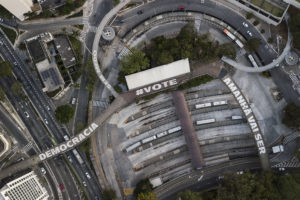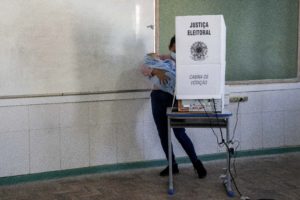Recent Developments in Human Rights Trials in Latin America from WOLA on Vimeo.
Panelists:
Dr. Terry Karl
Professor, Stanford University
Current legal actions underway to address historic human rights abuses in El Salvador
Dr. Jo-Marie Burt
Director, Latin American Studies, George Mason University, and WOLA Senior Fellow
The historic importance of the Fujimori trial in Peru for justice in Latin America
Dr. Victoria Sanford
Director, Center for Human Rights and Peace Studies, City University of New York
The Ríos Montt trial and other recent actions for human rights and justice in Guatemala
Moderation and Commentary: Geoff Thale, WOLA Program Director
In recent years, human rights prosecutions have advanced in cases of Latin American military officials, political leaders, and heads of state charged with responsibility for major human rights violations. In April of 2009, Peruvian president Alberto Fujimori was found guilty of crimes against humanity for his role in massacres and kidnappings committed by the country’s security forces during the 1990s internal armed conflict. He was sentenced to 25 years in prison in what has been seen as one of the most historic and important human rights trials in the Americas.
In El Salvador, due to an amnesty law passed in 1993, there has been little progress in the prosecution of human rights abusers. But through its use of international jurisdiction for human rights violations, a Spanish court has moved forward in bringing a case against members of the Salvadoran military who were involved in the brutal murder of six Jesuit priests in 1989. One of the defendants in that case was recently arrested in the United States on immigration charges. Meanwhile, a former Salvadoran general living in the United States is subject to deportation proceedings for his role in human rights abuses.
In Guatemala, there have been recent cases against high-ranking members of the military who were the intellectual and material authors of the worst human rights abuses committed during their civil war, including the August 2011 sentencing of four former members of the Guatemalan special forces unit known as the Kaibiles to over 6,000 years in prison. Currently, former military dictator Efraín Riós Montt is on trial for his leading role during the most brutal years of the conflict. His conviction would signal a significant shift in justice in Guatemala.
Other countries in Latin America have also recently made strides to address past abuses. Uruguay recently overturned their amnesty law, paving the way for justice for human rights violations committed during the 1970s and 1980s. Last November, Brazilian President Dilma Rousseff signed the Truth Commission into law, and will likely name the seven member commission in the coming months. Although the findings of the two-year commission will not have prosecutorial power, it will be a first step toward acknowledging and addressing abuses committed by the State during South America’s longest military dictatorship.


